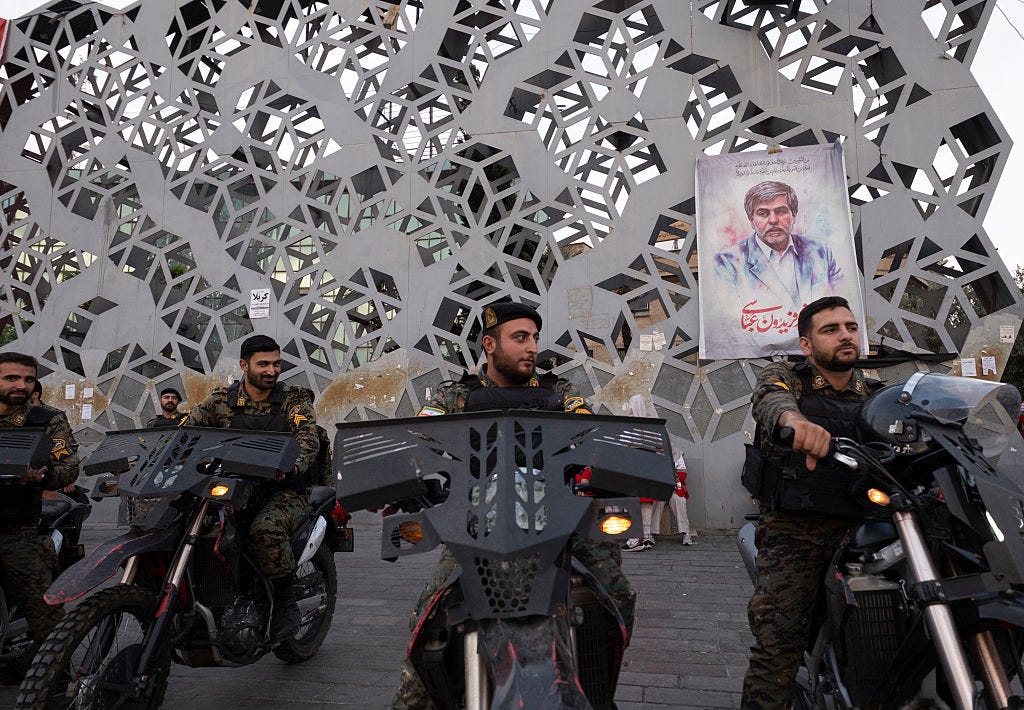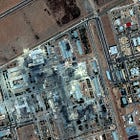
This article is brought to you by American Purpose, the magazine and community founded by Francis Fukuyama in 2020, which is proudly part of the Persuasion family.
Over the course of the 12-day war, Israel subjected the Islamic Revolutionary Guard Corps (IRGC) to a devastating combination of psychological and physical attacks aimed at destabilizing Iran’s military hierarchy. While the strikes shook the regime and killed high-level IRGC officials, no military commander has yet defected.
Well before that aggression, however, it was widely believed that Israel’s intelligence had significantly penetrated the Islamic Republic’s national security apparatus. In the aftermath of the strike that killed Hassan Nasrallah in October 2024, former Iranian president Mahmoud Ahmadinejad claimed that the head of the Israel desk at the Ministry of Intelligence (MOIS) was himself an agent of the Mossad. That the Israelis were able to locate and kill so many senior commanders on June 13 has all but confirmed for many within the regime that Israel maintains a network of spies at the highest levels of the Iranian government.
Still, a central question remains: why, in the face of such extreme pressure, do Iran’s military elites stay loyal to the regime? The answer is that they cannot afford to leave.
The Architecture of Elite Cohesion
The Islamic Republic has spent more than four decades creating a system in which loyalty is rewarded, dissent is punished, and defection is nearly impossible. Ayatollah Ali Khamenei protects loyalists, distributes privileges, and controls key appointments within the government. For military commanders, their entire careers and personal safety depend on Khamenei’s continued rule.
Under his leadership, any promotion from the first brigade level must be approved directly by the Supreme Leader’s office (Dafter Nezami-e rahbari), following the results of a thorough investigation into the individual’s security and ideological background to ensure their loyalty to Ayatollah Khamenei. Because these people owe their promotion to Khamenei, their futures collapse with him if he falls.
Iran’s military structure is built to prevent internal threats, such as a coup. The IRGC dominates the General Command (Setad-e Kole), which coordinates between Artesh (Iran’s conventional armed forces) and the IRGC. The leadership of Iran’s armed forces is often drawn from ideologically committed members, all of whom are personally loyal to Khamenei.
In addition to this system of promotion and division within the military, Ayatollah Khamenei uses three central policies to keep the Iranian armed forces under his control: intensive indoctrination, economic rewards, and selective repression.
Intensive Indoctrination
The Islamic Republic systematically inculcates a culture of loyalty towards the clerical regime in its armed forces, with the IRGC receiving the most intensive ideological and political training. The regime embeds clerics at all levels of the military, from general staff to lower platoons, and tasks them with promoting the regime’s ideology and monitoring personnel for dissent. Every branch of the military and security systems, from the Joint Chiefs of Staff down to the smallest units, has an Office of the Representative of the Supreme Leader. This office is led by Khamenei’s loyalist clerics and operates independently of the military chain of command, reflecting a unique and unaccountable decision-making process within the system.
Officers who show loyalty through religious participation or regime support are often rewarded with early promotions or key assignments, regardless of merit. These offices are also responsible for recruiting more religious and ideologically-aligned individuals and vetting their promotion from the lowest level to the top positions. This system is so extreme that about 40% of military training focuses on ideological matters, often at the expense of military competence.
Co-optation and Economic Incentives
Another essential tool for the Islamic Republic to ensure the loyalty of its armed forces, especially the IRGC, is economic reward. Over the years, the IRGC has evolved into a formidable military-industrial complex. It now dominates major sectors of the economy, including oil, construction, telecommunications, and even illicit trade.
Much of this wealth flows through elite-controlled foundations (known as bonyads) such as the Mostazafan Foundation, or through massive state-linked enterprises, including Khatam al-Anbia Construction Headquarters. Even the Artesh’s commanders, often seen as less ideologically driven, have been integrated into this system of patronage, receiving material rewards for their loyalty. The Iranian economy has received considerable attention, but the families of armed forces commanders have gone unnoticed. IRGC and Artesh commanders frequently list their sons-in-law as the proprietors of shell companies that are established to bypass sanctions and secure lucrative state contracts through intermediaries.
Consequently, high-ranking commanders have several avenues to reap the benefits of state-sanctioned corruption through exclusive government contracts, protected monopolies, and privileged access to subsidized imports. Economic privileges provide military elites with strong incentives to remain loyal, as defection would result not only in the loss of political power but also in a significant loss of wealth and social standing that could lead to an uncertain, often insecure, future in exile.
Surveillance and Repression
The Islamic Republic has also established an expansive surveillance system across all branches of the armed forces. Each branch has its own Counterintelligence Organization, independent of the military command and directly controlled by the Supreme Leader. These units, staffed by a mix of clerics and military officers, not only handle traditional counterintelligence tasks but also monitor internal loyalty and security. This constant oversight fosters a climate of fear, discouraging dissent.
The Islamic Republic also severely punishes any attempt at defection. Sidelined insiders, such as disgraced commanders, often remain within the system, hoping to regain favor rather than risk exile. For them, defection would mean abandoning their networks, wealth, and protection, with no guarantee of safety or influence elsewhere.
Even when low-ranking military personnel defect and flee the country, the Islamic Republic spares no effort in tracking them down and forcibly returning them. Iran’s military intelligence and security apparatus have actively operated abroad, particularly in neighboring countries like Turkey, where they collaborate with criminal networks to identify, abduct, and repatriate defectors. These operations are designed not only to punish those who flee but also to send a chilling message to others in uniform: defection comes at a high personal cost.
A telling example is the attempted abduction of a former Iranian naval officer—believed to be Mohammad Rezaie—in 2019. The IRGC orchestrated a complex scheme involving Turkish criminal gangs to lure Rezaie into a trap. This operation demonstrated the regime’s deep reach and willingness to use any means necessary to deter future military defections. In 2020, the Islamic Republic sought the help of criminal gangs in the United States to assassinate a high-ranking Iranian military defector in a witness protection program in Maryland. Despite these attempts to exert pressure on dissidents, in recent decades there have been few cases of members of the Iranian armed forces denouncing the regime. Even when mass protests have been followed by brutal repression—most notably after the death of Mahsa Amini in 2022—denunciations have been relatively small in scale and primarily come from the lower ranks.
In recent weeks, the Monarchist movement has launched a communication platform aimed at members of the military, law enforcement, intelligence services, and government institutions who wish to connect with Prince Reza Pahlavi and potentially defect from the regime. Using a QR code broadcast on Iran International TV, a satellite channel run by the Iranian diaspora, Pahlavi called on members of the armed forces to complete an online form and join his effort to overthrow the Islamic Republic.
According to Monarchist sources, around 20,000 people have submitted the form. While it remains unclear how many of these submissions are genuine—the regime is allegedly trying to infiltrate the campaign by feeding Pahlavi false information—the initiative signals that the opposition recognizes the critical role of military defection in applying pressure on the clerical establishment in Iran. Still, doubts persist about the platform’s effectiveness, mainly due to the pervasive fear of retaliation instilled by the regime and the absence of a clear and convincing alternative to the current system.
How to Facilitate Defection
Policies designed to encourage defections should be carefully crafted to make clear they are not a disguised way to promote regime change. The United States should offer incentives such as amnesty, safe relocation, and even permanent residency for defectors and their families. Many commanders’ children already study or live in the West. For example, the children of Mohammad Bagher Ghalibaf, former IRGC commander and current parliament speaker, have tried to obtain Canadian residency. These connections to the West can be leveraged to recruit or encourage defections.
The elimination of Iran’s first-generation commanders, those forged in the Iran-Iraq War, might open an opportunity for competition and rivalry among younger generations, which could create fissures within Iran’s military. Eliminating military commanders can also instill fear in others who may hesitate to collaborate or cooperate, fearing they could face the same fate if they refuse to comply. This policy can foster a paranoid atmosphere among armed forces commanders, leading to a lack of trust, as they may suspect that intelligence agencies have recruited others who are still alive.
In brief, Iran’s military elites remain loyal not out of ideology, but out of survival. With the right combination of pressure and incentives, especially during moments of crisis, the system can be challenged.
Saeid Golkar is an associate professor of political science at the University of Tennessee-Chattanooga, a senior advisor at United Against Nuclear Iran (UANI), and a writing fellow at the Middle East Forum.
Follow Persuasion on X, LinkedIn, and YouTube to keep up with our latest articles, podcasts, and events, as well as updates from excellent writers across our network.
And, to receive pieces like this in your inbox and support our work, subscribe below:




